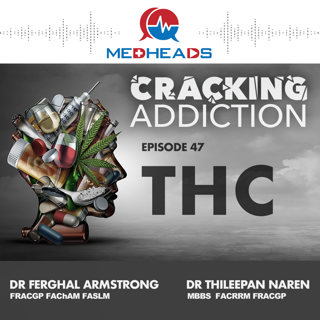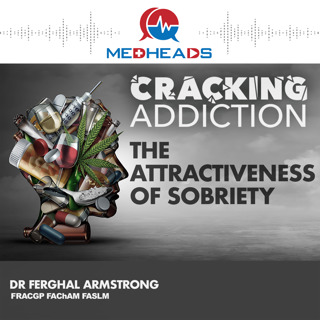
The Attractiveness of Sobriety
Recovery isn’t just about stopping substance use; it’s about transforming your life. This episode covers key points like the idea of “white knuckling” versus a more holistic approach to sobriety, and how hitting rock bottom can be a powerful catalyst for change. Jesse, a former addict turned lived experience peer worker, shares his own journey, revealing how finding your authentic self can turn recovery into an exciting, fulfilling process.**Learning Outcomes:**1. **Understanding the True Nature of Recovery:** It’s crucial to understand that recovery is far more than just abstaining from harmful substances. Jesse highlights that true recovery is about discovering and connecting with your authentic self. This shift in perspective can turn what seems like a daunting process into an attractive and fulfilling journey. By acknowledging that recovery involves reconnecting with your real self, you can focus on the long-term benefits rather than short-term sacrifices.2. **Recovery vs. White Knuckling:** Jesse discusses the exhausting and often unsuccessful method known as "white knuckling"—relying solely on willpower to refrain from substance use. He outlines how this is not sustainable for those deeply entrenched in addiction. Instead, a structured recovery programme alongside community support can offer a more sustainable and fulfilling path to sobriety. Recognising this can help you align your recovery efforts more effectively and avoid the burnout associated with sheer willpower.3. **The Role of Hitting Rock Bottom:** Ferghal and Jesse delve into the importance of hitting rock bottom as a catalyst for embracing recovery. Jesse explains how the sheer misery of his lowest point opened his eyes to the necessity of change. This realisation can act as a turning point, making the attractions of a clean, healthy life more apparent. This insight can be both a wake-up call and a motivator for those reluctant to embark on their recovery journey.4. **The Concept of Self Care in Recovery:** One of the standout themes is the idea that recovery demands rigorous self-care. Jesse’s tale of prioritising diet, exercise, and mental wellness paints a vivid picture of how taking care of oneself daily is not a luxury but a necessity. This actionable takeaway can help you build a solid foundation for long-term sobriety by instilling habits that support both your physical and emotional well-being.**Actionable Takeaways:**1. **Engage with Recovery Communities:** Jesse highlights how seeing others with qualities he admired—patience, calmness, wisdom—made recovery appealing for him. This underscores the importance of surrounding yourself with supportive individuals who inspire you. Seek out local or online recovery support groups; these communities can be invaluable in offering the encouragement and motivation you need to stay on track.2. **Explore New Hobbies and Interests:** Breaking free from the cycle of addiction often requires filling your life with new, healthy activities. Jesse mentions trying ultra running, hiking, and even yoga retreats to fulfil his need for excitement. Make a list of activities you’ve always wanted to try and commit to exploring at least one new interest a month. This approach not only keeps you engaged but also helps in building a new identity beyond addiction.3. **Prioritise Self-care:** A recurring theme in this episode is the crucial role of self-care in recovery. Jesse’s disciplined routine, including meditation, yoga, and maintaining a balanced lifestyle, serves as a powerful model. Develop a daily self-care regimen that includes physical, mental, and emotional health practices. Prioritising self-care helps prevent relapse and promotes overall well-being.4. **Shift Your Perspective on Fun:** One of the most profound insights Jesse shares is how his...
24 Juli 202428min
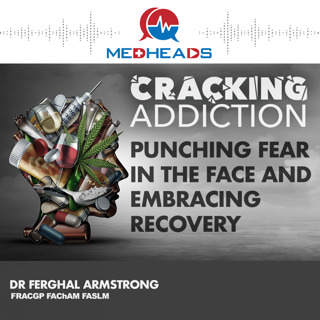
Punching Fear in the Face and Embracing Recovery
Ferghal Armstrong sits down with Thomas Conrad, a recovery expert who transformed his life from rock bottom to running a successful addiction treatment centre. This episode is filled with powerful insights and actionable strategies that can guide both individuals and their families through the labyrinthine path of addiction and recovery. If you're committed to understanding the challenges of addiction and finding effective ways to overcome them, this episode is a must-listen.**Episode Summary**This episode delves deeply into Thomas Conrad's journey from struggling with alcohol addiction to becoming a beacon of hope for others. With his relatable yet extraordinary story, Thomas sheds light on the complexities of recovery, the power of a supportive community, and the critical role that faith and spirituality can play. If you're searching for inspiration and practical advice on navigating the path to sobriety, this conversation offers a treasure trove of wisdom.**Learning Outcomes**1. **Understanding the Role of Family and Friends in Recovery**Thomas emphasises the significant impact that a person's social support system can have on their recovery journey. Friends and family members can either enable or hinder progress, making it essential for them to be educated and supportive. Thomas explains that setting firm boundaries and intervening forcefully when necessary can be life-saving acts. Learning how to involve your loved ones in your recovery process can make a significant difference and foster an environment conducive to healing.2. **Concept of a Higher Power in Recovery**Spirituality and faith can often be controversial topics in the realm of addiction recovery. Thomas discusses how reinterpreting the concept of a higher power, as suggested by Russell Brand, can make the twelve steps more accessible to those who struggle with traditional religious notions. This broader perspective can open doors for many individuals who might otherwise feel alienated. Embracing a flexible approach to spirituality can be a powerful tool in the recovery process.3. **The Importance of Consequences in Recovery**Thomas shares the critical role that consequences played in shifting his mindset from pre-contemplation to active recovery. Sometimes, tangible consequences like a DUI or job loss can serve as a much-needed wake-up call. Thomas explains that for those who might be functional alcoholics, these jolts of reality are often crucial for propelling them toward change. Understanding the importance of consequences can help frame recovery as a necessary step rather than an imposed punishment.4. **Controlled Risk Exposure for Children**The conversation also touches on how to communicate the risks of drugs to children. Thomas and Dr Ferghal discuss the importance of controlled risk exposure as a teaching tool. This strategy might involve setting examples, sharing real-life stories, and maintaining open communication. Cultivating an environment where children feel comfortable discussing such issues can lead to better-informed decisions and healthier long-term choices.**Quote **Thomas Conrad said it best: "To overcome addiction, you have to punch fear in the face. Stepping into treatment was the scariest yet most liberating choice I ever made."Russell Brand 12 Stepshttps://www.russellbrand.com/wp-content/uploads/2017/09/russell-brand-recovery-the-program.pdf
17 Juli 202436min

Can 4 Hours of Sleep Really Kill You?
Have you ever wondered how the quality of your sleep impacts your mental health? Or how the intricacies of sleep deprivation can influence everything from decision-making to long-term brain health? In this riveting episode of "Cracking Addiction," Dr Ferghal Armstrong and Dr Richard Bradlow dive deep into the complex, bidirectional relationship between sleep and mental health. Whether you're grappling with insomnia, curious about ADHD, or just keen to improve your sleep hygiene, this episode packs a wealth of information and actionable advice. Listen to gain valuable insights and transform how you view the power of sleep.**Sleep and Mental Health Interlink**In this episode, Dr Ferghal Armstrong and Dr Richard Bradlow explore various mental health disorders, such as melancholic and atypical depression, and their distinct sleep patterns. They discuss how poor sleep can aggravate existing mental illnesses and vice versa. Understand why sleep is crucial and how its deprivation can lead to cognitive and emotional impairments. Gain practical, scientific knowledge on how to enhance your sleep quality and, by extension, your mental health.**Best Quote:**"Sleep deprivation ultimately kills you, and it kills you quicker than starvation."**Learning Outcomes:**1. **Understanding the Bidirectional Relationship:** Explore the fascinating concept of the bidirectional relationship between sleep and mental health. Learn how poor sleep can precipitate mental health issues like anxiety and depression and how these conditions can further deteriorate sleep quality. Understanding this relationship can prompt more effective treatment approaches. Practising better sleep hygiene can potentially alleviate some symptoms of mental health disorders.2. **Melancholic vs Atypical Depression:** Differentiate between melancholic and atypical depression regarding their impact on sleep. Melancholic depression is linked with early morning awakenings, while atypical depression is associated with hypersomnia. This knowledge can help you identify what type of depression may be affecting you or your loved ones. By recognizing these patterns, you can seek appropriate treatment options.3. **Impact of Sleep Deprivation on Cognitive Function:** Realise how sleep deprivation affects cognitive functions, such as decision-making and ethical awareness. Discover that being awake for 16 hours renders cognitive impairment equivalent to a 0.05 blood alcohol level. This insight can incentivise you to prioritise sleep, especially if your day-to-day activities involve crucial decision-making. Adequate sleep can improve your productivity and emotional well-being.
10 Juli 202421min
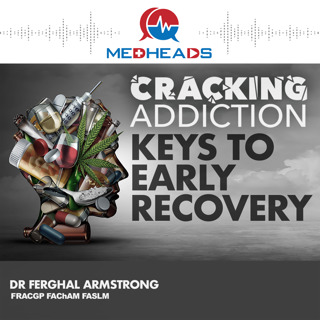
Keys to Early Recovery: Jesse Ball on Honesty and Support
Dr. Ferghal Armstrong and Jesse Ball explore the foundational aspects of early recovery from addiction, highlighting the roles of honesty, support systems, and effective routines. Jesse shares how a no-nonsense, empathetic counsellor with lived experience catalysed his transformation. This episode delves deep into practical strategies to navigate the vulnerable early stages of sobriety and sustain long-term recovery. Listen in for invaluable lessons that go beyond recovery—these are life skills everyone should possess.**Learning Outcomes and Actionable Takeaways:**1. **Honesty and Vulnerability in Recovery:**Jesse emphasises the pivotal role of being completely honest with his counsellor. The absence of judgement and the presence of lived experience created a safe space for Jesse to be vulnerable. By being open about his behaviours and feelings, Jesse was able to receive tailored, effective advice, which was instrumental in his recovery. Honesty not only builds trust but also catalyses tailored interventions essential for overcoming addiction.2. **The Power of Support Systems:**One of the most significant aspects of Jesse’s recovery was his willingness to listen to others who had walked the same path. Building relationships with those who have lived experience can provide crucial support and inspiration. During weak moments, reaching out to someone who understands your struggle can make all the difference. Jesse's experience underscores the importance of having a robust support network ready to offer reasoning when self-delusion creeps in.3. **Establishing a Routine:**Jesse’s disciplined approach to his daily routine played a critical role in his recovery. From morning walks to regular therapy sessions and meetings, a structured day helped him stay focused and avoid relapse. Incorporating simple, healthy habits like exercising, eating well, and staying occupied can support mental clarity and emotional stability. A consistent routine creates a sense of normalcy and purpose, essential in the tumultuous early stages of recovery.4. **Cutting Ties with Negative Influences:**Jesse made the tough but necessary decision to distance himself from his old friendship group, realising the importance of eliminating risky environments. This bold choice was driven by understanding that his life depended on his recovery. By only engaging in safe social interactions, Jesse minimised triggers and maximised his chances of staying sober. This teaches us the crucial lesson that prioritising health sometimes means making difficult choices about relationships.5. **Proactive Planning for Crises:**Jesse's proactive strategy to pre-empt and address moments of weakness was another key to his success. Knowing the likelihood of temptation, he ensured he had trusted individuals to call when those 'mind worms' started speaking. This preparedness to seek external voices of reason is critical in averting relapse. Planning for crises is an actionable step everyone in recovery should adopt, recognising that the path is fraught with moments requiring external reinforcement.**Quote:***"Often, it's someone else's voice of reasoning during those really weak, vulnerable moments that can be the difference between success and failure."* – Jesse Ball.
3 Juli 202418min
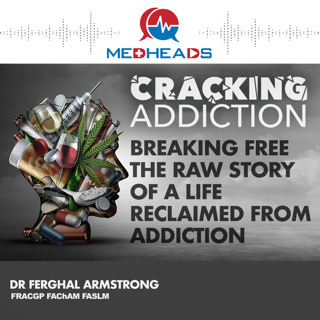
The Turning Point: How Jesse Escaped the Grips of Addiction
In this episode, we have the privilege of hearing from Jesse Ball, a courageous individual with lived experience in the realm of addiction and recovery.Jesse takes us on an intimate journey through his turbulent past, sharing candidly about his use of various substances starting from his early teens, driven by the desire to fit in and cope with life’s challenges. He opens up about the harrowing depths of his addiction, the disconnection from self, and the mental and physical toll it took on him.Most importantly, Jesse delves into the pivotal moments that spurred him toward recovery, revealing the internal battles and the persistent voice of hope that eventually led him to seek help. Through his story, we gain invaluable insights into the complexities of addiction and the therapeutic processes that can make a difference.Join us as Jesse shares his profound wisdom on the importance of meeting people where they are in their journey, the role of spirituality in healing, and the transformative power of genuine human connection. Whether you’re struggling with addiction, a healthcare provider, or simply looking to understand more about this challenging issue, Jesse’s story is sure to inspire and enlighten.
26 Juni 202420min

Digital Breakthroughs in Alcohol Addiction Recovery
Are you or someone you know struggling with alcohol use disorder? In this video, I sit down with Jonathan Hunt-Glassman, the CEO of Ore Health, to uncover groundbreaking strategies for managing alcohol use disorder. From effective **medication** options to the critical role of digital health technologies, we delve deep into how you can begin your journey to recovery today.Jonathan and I discuss everything from first-line treatments like **naltrexone** and **acamprosate** to alternative medications and talking therapies. You'll learn why **medication** is crucial but not the only solution, and how digital solutions can make accessing healthcare easier and more private. Our conversation is packed with actionable insights that can help you or your loved ones make significant strides in overcoming alcohol use disorder.
19 Juni 202420min

From Blackouts to Breakthroughs: An Insider's Story of Recovery and Hope
In this compelling episode of Cracking Addiction, Dr Ferghal Armstrong welcomes Jonathan Hunt-Glassman, an individual with lived experience of alcohol misuse and the CEO of Oar Health. Jonathan provides a raw and honest account of his struggles with alcohol, starting from high school right through to his twenties. His journey involved excessive binge drinking, blackouts, and multi-day benders, ultimately leading to the physical and mental health repercussions associated with alcohol addiction.**Key Points Covered:**1. **Understanding the Root Causes**:- Jonathan delves into the social anxiety that drove his alcohol misuse. As Dr Ferghal notes, understanding the underlying pain is crucial.2. **The Impact of Social Media and COVID-19**:- The episode discusses how the increase in digital communication and social isolation could contribute to future spikes in alcohol use disorders.3. **The Importance of Support Systems**:- Jonathan highlights how a supportive healthcare practitioner, empathic friends, and a loving partner were instrumental in his recovery.4. **Tools for Recovery**:- Jonathan shares the multifaceted toolkit that helped him, including goal-setting, medication, therapy, and lifestyle changes.**Learning Outcomes:**1. **Identifying Root Causes**:- By listening to Jonathan's experiences, you will learn how social anxiety and feelings of insecurity can lead to problematic drinking. Understanding these root causes can help in seeking appropriate therapies to address them.2. **The Role of Support Systems**:- This episode underscores the importance of having a reliable support system. Friends and family play a critical role in recovery, providing non-judgmental, loving support that can significantly impact an individual's journey towards sobriety.3. **Utilising Healthcare Professionals**:- The value of a compassionate healthcare provider cannot be overstated. As Jonathan explains, a simple phrase like "We can work with that" can break down barriers of fear and shame, making the initial steps to recovery much more manageable.4. **Building a Toolkit for Recovery**:- Jonathan discusses the various tools that worked for him, including medication, therapy, and personal strategies like avoiding drinking on an empty stomach. Assembling a similar toolkit can provide a structured and effective approach to managing alcohol use disorder.**Actionable Takeaways:**1. **Address Social Anxiety**:- Seek professional help to address any underlying social anxiety or insecurity. Therapies such as Cognitive Behavioural Therapy (CBT) can be incredibly effective in mitigating these triggers.2. **Establish Clear Goals**:- Set clear, achievable goals for your alcohol consumption. For Jonathan, a key goal was never to blackout again; similar concrete objectives can provide direction and motivation.3. **Engage with Health Practitioners**:- Don’t hesitate to consult with healthcare professionals. A supportive and understanding medical practitioner can offer crucial guidance and prescribe helpful medications if necessary.4. **Rely on a Support Network**:- Lean on your friends and family. Their support can provide emotional resilience and practical help, such as non-judgemental feedback or participating in healthier, sober activities.**Quote:**"We can work with that."This phrase, used by Jonathan's healthcare provider, signifies the power of empathy, understanding, and collaboration in the recovery journey.
12 Juni 202418min
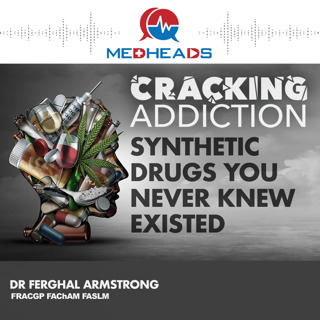
Synthetic Drugs You Never Knew Existed
Are you curious about the hidden dangers lurking in the world of synthetic opioids? In this episode of "Cracking Addiction," Dr Ferghal Armstrong sits down with the incredible Prof. Suzanne Neilsen, Deputy Director of the Monash Addiction Research Centre, to dive deep into the chilling rise of nitazenes in Australia. As high-potency synthetic opioids, nitazenes are causing waves of concern, and their impact could be closer to home than you think.What's a nitazene, you ask? These potent synthetic opioids came into existence through pharmaceutical research in the 1950s but are now making a perilous comeback in the illicit drug scene. As Suzanne and I chat, we unravel why these forgotten compounds are suddenly re-emerging and the harrowing effects they have, particularly respiratory depression. Also, did you know that nitazine contamination could be lurking in various recreational drugs like MDMA or ketamine, posing a lethal threat unexpectedly?But don't just take my word for it—watch the video and have your questions answered by one of Australia’s leading experts in addiction research. Prof. Neilsen steps us through the nuances of these dangerous compounds, their presence in recreational drugs, and the life-saving importance of naloxone for overdose reversals.**Learning Outcomes:**1. **Understanding Nitazines:**- Learn about Nitazenes, their chemical structure, and why they are considered highly potent opioids.- Suzanne reveals that although they were initially developed for potential therapeutic uses, their severe side effects, including significant respiratory depression, halted their progress.- Discover the historical context that has led to their re-emergence in the illicit drug scene.- Recognise the distinction between different types of Nitazenes and their varying potencies and half-lives.2. **Risk Awareness and Harm Reduction:**- Understand the risks associated with Nitazene contamination in various illicit drugs, such as MDMA, ketamine, and cocaine.- Gain insights into how synthetic opioids like Nitazenes and fentanyl increase the danger of overdose due to their potency and rapid onset.- Develop awareness of the “sloppy drug dealer” theory and its implications for contamination.- Learn about the broadening need for harm reduction initiatives that address not just opioid users but anyone using illicit drugs.3. **Importance of Naloxone:**- Comprehend the role of naloxone in reversing opioid overdoses, even caused by potent synthetic opioids like Nitazenes.- Learn about the potentially higher doses of naloxone required to reverse nitazene-induced overdoses.- Understand the importance of having multiple doses of naloxone on hand and the implications for stocking it in harm reduction services.- Recognise the balance needed in administering naloxone to avoid severe withdrawal symptoms in patients.**Actionable Takeaways:**1. **Increasing Awareness and Education:**- Educate yourself and your community about the dangers of synthetic opioids like nitazenes.- If you’re in a position to influence policy, advocate for expanding drug-checking services to help identify contaminants before use.- Spread the word about the importance of having naloxone readily available, especially in communities at risk.- Support initiatives that provide harm reduction training to a broad audience, including those who might not identify as opioid users.2. **Advocating for Harm Reduction Services:**- Push for the establishment and funding of drug checking services in all states and territories, not just limited areas.- Encourage local governments and organisations to support evidence-based harm reduction services.- Participate in or initiate community...
5 Juni 202416min
